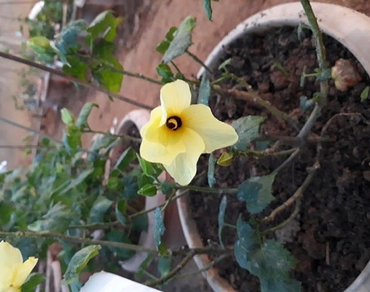Agronomic evaluation of introgressed lines developed for yellow vein mosaic disease resistance in okra (Abelmoschus esculentus L. Moench)
Singh Gagandeep, Pathak Mamta, Pathak Dharminder, Sharma Abhishek, Chawla Neena
Research Articles | Published: 15 March, 2024
First Page: 659
Last Page: 668
Views: 3258
Keywords: Backcross breeding, Disease incidence (DI), Resistance, White fly, Yellow vein mosaic
Abstract
The yield and quality of okra is greatly reduced by Yellow Vein Mosaic Disease (YVMD). Although disease can be managed by controlling vector population through chemicals but the cultivation of resistant varieties is most economical and ecofriendly. Therefore, the present study was planned to evaluate the BC1F2:3 progenies derived from a cross between susceptible parent Punjab Padmani as female and resistant parent A. angulosus (IC-203,833) as pollen parent. A total of eighty-nine BC1F2:3 progenies along with seven checks (Punjab-8, Punjab Padmini, Punjab Suhawani, PORL, POL-44, POL-78 and Pusa Sawani) were grown in alpha lattice design comprising of eight blocks with two replications. The analysis for variation of data revealed that all the evaluated traits were found to be statistically different from all the checks. Among all evaluated progenies, forty-one progenies were found to be resistance with zero per cent disease incidence at 90 days after sowing. Over all, the seven lines (PAUAIOL-251,255,256,260,301,313 and 323) free from YVMD were identified that had significantly higher yield per plant as comparison to local check Punjab Suhawani (97.9 g/plant). The line PAUAIOL-324 was selected as top scorer for yield per plant (130.2 g) exhibiting significantly lower number of days to 50% flowering (38 days), higher no. of fruits on main stem (8.5), fruit weight (11.9 g) and plant height (80.0 cm) than local check Punjab Suhawani. The selected resistant lines could be advanced for use in future breeding program for okra improvement.

References
Anonymous (2018) Package and practices for cultivation of vegetables.pp.1-196. Punjab Agricultural University, Ludhiana, Punjab
Anonymous (2022) Area, Production and Productivity of Vegetables. In: Area, production and productivity of okra in India (1987–1988 and 1991-92 to 2020-21-3rd advance estimates). Available via http://www.indiastat.com. Accessed 25 May 2023
Anonymous (2021) Package and practices for cultivation of vegetables. Punjab Agricultural University, Ludhiana, Punjab
Bryant LA, Montecalvo JJR, Morey KS, Loy B (1988) Processing and nutritional properties of okra seed products. J Food Sci 53:810–816
Capoor SP, Varma PM (1950) Yellow vein mosaic of Hibiscus esculentus (L). Indian J Agric Sci 20:217–230
Chandra S, Bhardwaj ML, Kumar R, Kumar D, Kumar S, Dogra B, Sharma S (2014) Estimation of parameters of variability for different quantitative traits in okra, Abelmoschus esculentus (L) Moench. Int J Farm Sci 4:33–41
Elbaz M, Hanson P, Fgaier S, Laarif A (2016) Evaluation of tomato entries with different combinations of resistance genes to tomato yellow leaf curl disease in Tunisia. Pl Breed. https://doi.org/10.1111/pbr.12375
Garg R (2009) Characterization and evaluation of okra [Abelmoschus esculentus (L.) Moench]. M.Sc. thesis, Punjab Agricultural University, Ludhiana, India
Gemede HF, Negussie Ratta N, Gulelat Desse Haki GD, Beyene A, Z W F (2015) A review: nutritional quality and health benefits of Okra (Abelmoschus esculentus). Global J Med Res 14:29–37
Hazra P, Basu D (2000) Genetic variability, correlation and path analysis in okra. Ann Agric Res 21:452–453
Hazra P, Basu D, Sahu FK (2002) Genetic divergence in Okra. Indian Hort 59(4):406–404
Khan SH, Ahmed JN (2005) Variability and correlation studies in okra (Abelmoschus esculentus L. Moench). J Res SKUAST 4:179–183
Koundinya AVV, Dhannkhar SK, Yadav AC (2013) Genetic variability and divergence in okra (Abelmoschus esculentus (L) Moench). Indian J Agril Sci 83:685–688
Kumar DS, Tony DE, Kumar AP, Kumar KA, Rao DBS, Nadendla R (2013) A review on: Abelmoschus esculentus (Okra). Int Res J Pharm App Sci 3(4):129–132
Kumar R, Kumar SN (2010) Heterosis and combining ability for fruit yield in okra. [Abelmoschus esculentus (L.) Moench]. Crop Improv 37:41–45
Kumar R, Yadav RK, Bhardwaj R, Baranwal VK, Chaudhary H (2016) Studies on genetic variability of nutritional traits among YVMV tolerant okra germplasm. Indian J Hort 73(2):202–207
Kumar S, Reddy MT (2015) Morphological characterization and agronomic evaluation of yellow vein mosaic virus resistant single cross hybrids for yield and quality traits in okra (Abelmoschus esculentus L. Moench). Open Access Libr J 2. https://doi.org/10.4236/oalib.1101720
Kumar V, Amit K, Rajshree G (2011) Estimation of genetic parameters in okra for quantitative traits. Indian J Hort 68:336–339
Nwangburuka CC, Denton OA, Kehinde OB, Ojo DK, Popoola AR (2012) Genetic variability and heritability in cultivated okra [Abelmoschus esculentus (L.) Moench]. Spain J Agric Res 10:123–129
Olayiwola MO, Ariyo OJ, Ojo DK (2014) Evaluation of genetic variability among okra genotypes (Abelmoschus esculentus) L. (Moench). J Plant Pest Sci 21:66–73
Rao GKP, Sulladmath (1977) Changes in certain chemical constituents associated with maturation of okra [Abelmoschus esculentus (L.) Moench]. Veg Sci 4:37–42
Raychaudhari SP, Nariani TK (1977) Viruses and mycoplasma diseases of plants in India. Oxford and IBH publishing Co., New Delhi
Reddy MT (2015) Crossability behaviour and fertility restoration through colchiploidy ininterspecific hybrids of Abelmoschus esculentus × Abelmoschus manihot subsp. tetraphyllus. Int J Pl Sci Eco 1(4):172–181
Reddy MT, Babu KH, Ganesh M, Begum H, Reddy RSK, Babu JD (2013) Exploitation of hybrid vigour for yield and its components in okra [Abelmoschus esculentus (L.) Moench]. Amer J Agric Sci Tech 1:1–17
Reddy TM, Kadiyala H, Mutyala G, Hameedunnisa B (2012) Heterosis for yield and yield components in okra (Abelmoschus esculentus (L.) Moench). Chil J Agric Res 72(3):316–325
SAS version 9.4, SAS Institute, Inc., Cary, NC, USA
Solankey SS, Akthar S, Kumar R, Verma RB, Kumar S (2014) Seasonal response of okra (Abelmoschus esculentus L. Moench) genotypes for okra yellow vein mosaic virus incidence. Afr J Biotech 13(12):1336–1342
Author Information
Department of Vegetable Science, College of Horticulture & Forestry, Ludhiana, India